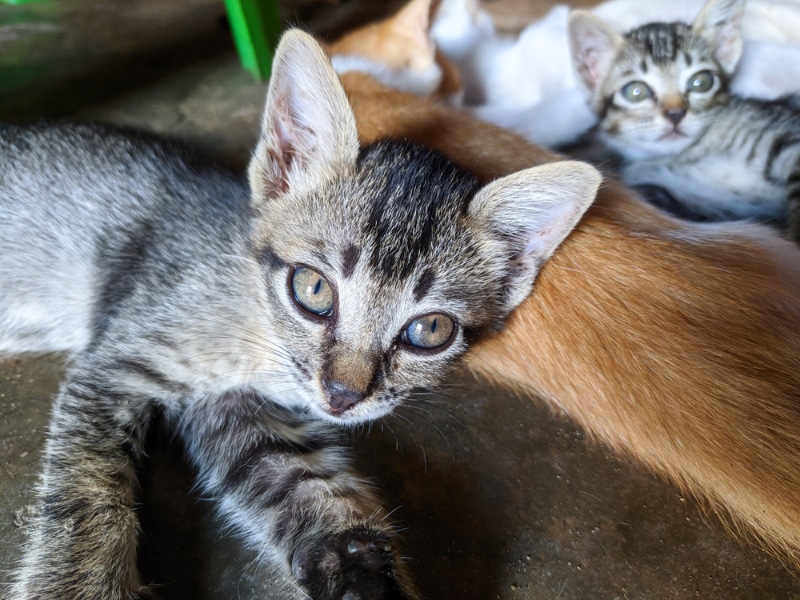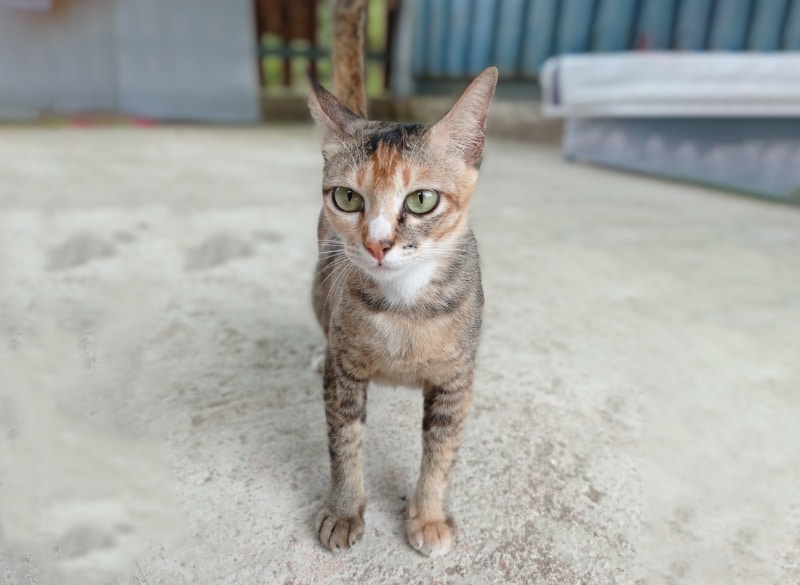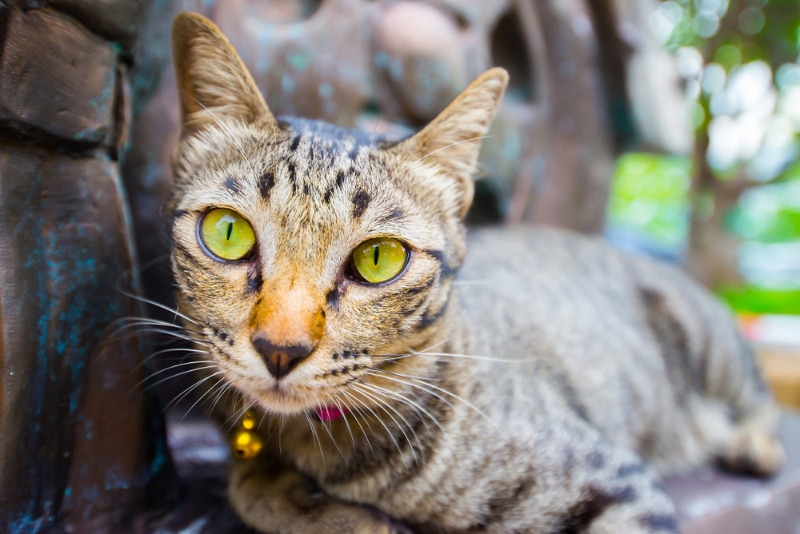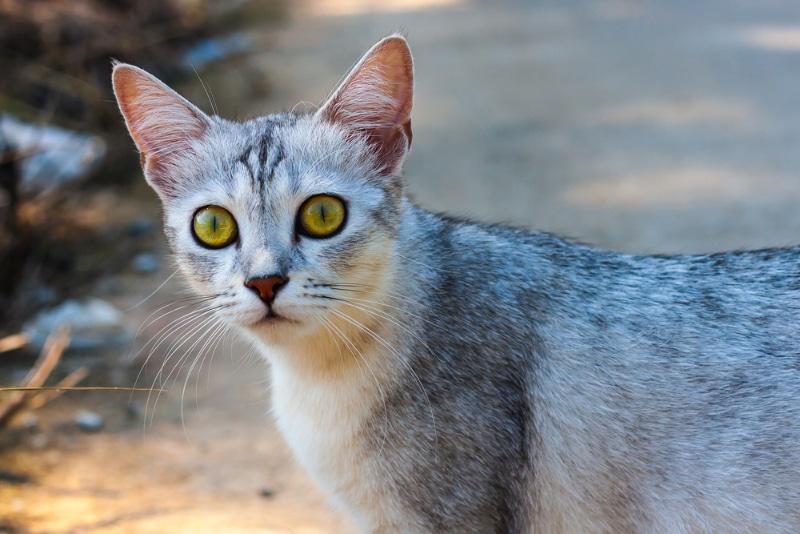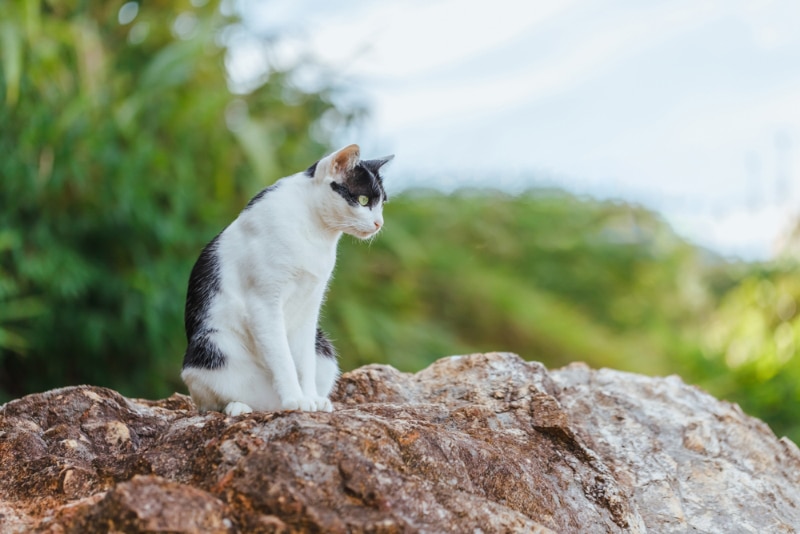Click Below to Skip Ahead
Asian cats are a small group of breeds which are lots just like the Burmese cat, except they are available in a wide selection of coat patterns and colours. Interestingly, these cats were by chance created in the UK within the early Nineteen Eighties.
Cats within the Asian breed group look almost equivalent regarding physical characteristics. It’s their coats that make them look different. All of them are inclined to have the identical temperaments, personalities, and instincts. Read on if you would like to learn more about these easy-going cats:
Breed Overview
| Weight: | 6.5–13 kilos |
| Lifespan: | 14–16 years |
| Colours: | A wide range of colours and patterns |
| Suitable for: | Families, singles, seniors, houses, apartments |
| Temperament: | Smart, friendly, affectionate, attention-seeking, demanding |
There are five variations that make up the Asian breed cat group. They’re the Burmilla, Bombay, Asian Self, Smoke, and Tabby. Long-haired cats of any variety are known as Tiffanys. The Asian cat coat is often superb, glossy, and glossy, like satin. Coat colours are varied and may tackle any style of pattern, including tortoiseshell and solid.
Asian Cat Characteristics
Asian Kittens
Image Credit: syahrilnggilu, Shutterstock
Asian kittens are gentle, curious, and affectionate. They like getting attention and luxuriate in finding warm, soft places to cuddle up in. They’re interactive and like toys but could be a bit territorial about them when fidgeting with other kittens. While adults are considered outgoing, kittens are a little bit more reserved. They have an inclination to follow around their mothers and mimic what they see. Once their mother is not any longer around, they begin learning to turn out to be independent.
Asian cats grow fast, so every second of their kittenhood must be enjoyed and appreciated. If socialization and travel practices are implemented during kittenhood, Asian cats get together with strangers and other pets and won’t mind traveling, whether to the vet or on vacation. They will learn to tolerate and even enjoy travel in cars and on planes and trains.
Temperament & Intelligence of the Asian Cat
Image Credit: Taizirosan_image, Shutterstock
The Asian cat is sensible, sweet, curious, interactive, and affectionate. They yearn for attention and can follow a companion across the house all day to get attention if obligatory. They tackle some independent characteristics but don’t like being alone at home all day. Due to this fact, someone, including other pets, have to be around to maintain them company.
They’re confident cats who will not be afraid to try latest things, especially with the encouragement and support of their human companion. They’re inquisitive, so when left alone for too long, they’re liable to turn out to be “mischievous” and do things like rip pages of a book, wreck the curtains, chew on socks and shoes, and scratch the couch.
Are These Cats Good for Families? 👪
Yes, Asian cats are great family pets, regardless of the dimensions or scope of the family. They get along well with children, and they’re going to happily play or snuggle with them, depending on what the occasion calls for. They must be socialized while still young to make sure they will handle a sturdy family life stuffed with noise and laughter.
Children must be taught to handle the cats with care and at all times be supervised until proven accountable for proper caretaking. Asian cats can do well in each apartment and house settings. If there may be enough room for the family to live within the household, there may be enough room for one or two Asian cats.
Does This Breed Get Together with Other Pets?
Asian cats normally get together with other animals within the household, especially cats of the identical temperament. They will live with dogs which are low-key and non-confrontational. They might even learn to get together with animals like ferrets and rabbits if taught while still young kittens.
It’s important to notice that each cat is exclusive, regardless of their breed, so some Asian cats may not wish to live with other animals regardless of how much socialization they get once they are young.
Things to Know When Owning an Asian Cat:
It’s best to know several facets of owning an Asian cat before deciding whether or not they’re right to your household and lifestyle. What should an Asian cat eat? How much exercise do they need? Are there any health problems to fret about? The answers to those questions and more might be found below:
Food & Weight loss plan Requirements 
Like all felines, Asian cats are carnivores. Due to this fact, they require high-quality industrial wet or dry food that comprises real meat as the primary ingredient(s). It’s a great idea to decide on organic food products that don’t contain artificial flavoring or colorings. Organic products don’t contain genetically modified ingredients either.
Select brands designed specifically for kittens, adults, and seniors throughout your Asian cat’s lifespan to make sure they get the best amounts of protein, fats, and other nutrients they should stay completely happy and healthy. Treats must be reserved for training, as rewards, and through special occasions, as any more can result in problems like obesity and diabetes.
Your Asian cat should get all of the nutrition they need from their regular meals, so treats are only additional calories. Treats should consist of high-protein industrial options and whole foods similar to cooked chicken or fish with no seasoning. Not more than a teaspoon or so of whole food must be offered at a given time as a treat or snack. Consult with your veterinarian to find out exactly what you need to be feeding your Asian cat between meals.
Image Credit: SERASOOT, Shutterstock
Exercise 🐈
All Asian cats need exercise, but they will get all that they need inside the confines of their homes if the best mechanisms are put in place. They need to have access to varied toys, scratching posts, and climbing trees to interact with throughout the day. Interactive and puzzle toys are unbelievable activities that will help keep your kitty entertained when everyone seems to be away from home.
It is important to spend at the very least quarter-hour a day interacting and fidgeting with your Asian cat to be sure that they’re moving enough and getting enough mental stimulation. Playing together offers a superb opportunity to bond and create an enduring relationship that exceeds mere “roommate” status.
Training 🧶
It’s unnecessary to coach your Asian cat since they’ll naturally learn the behaviors you would like them to keep up based in your interactions with them. Nonetheless, Asian cats are intelligent so it’s possible to coach them to do quite a lot of things, similar to how one can sit, lay down, stay, raise their front legs, and even spin around. All of it is dependent upon how you would like to interact together with your cat as time goes on.
Grooming ✂️
Short-haired Asian cats don’t require as much grooming because the long-haired (Tiffany) varieties. Short-haired cats must be combed or brushed at the very least once every week to maintain shedding under control, while this practice should begin at the very least twice every week for the longer-haired cats. Regular nail cutting could also be obligatory depending on how much your cat scratches their nails on available posts, towers, and toys.
Cats can develop plaque and gum disease, so it’s necessary to get them used to having their teeth brushed. You need to use a silicone finger toothbrush if obligatory. In case your cat absolutely cannot stand having their teeth brushed, you possibly can offer them day by day dental chews to assist ward off dental problems. Asian cats generally don’t have to be bathed unless they get muddy or extra dirty in a roundabout way.
Image Credit: THIRAWAT KAYUNKAY, Shutterstock
Health and Conditions 🏥
Asian cats are generally healthy animals and may live 14 to 16 years (sometimes even longer!). Nonetheless, there are just a few health conditions that they might be prone to depending on their heritage and breeding practices.
Serious Conditions
- Diabetes mellitus
- Polycystic kidney disease
- Progressive retinal atrophy
- hypokalemia
Male vs Female
There are minor noticeable differences between female and male Asian cats. As an illustration, the males are frequently only a bit taller and heavier than the females. Males also are inclined to be a little bit more independent.
Females are frequently easier to potty train than males. Nonetheless, that appears to be the top of the noticeable differences. Each female and male cats are affectionate, interactive, and loving toward their human companions.
3 Little-Known Facts Concerning the Asian Cat
1. They Can Be a Bit Clingy
Asian cats are known for his or her need for affection and tendency to be clingy. They’ll follow their human companions around and grab a lap every time they’ve the chance. They’re unhappy sleeping away from their human companion at night, and so they don’t wish to spend time alone when even one person is at home to maintain them company.
Their clinginess could be a bit overwhelming and even annoying at times. Spending uninterrupted quality time with them is an efficient technique to ensure their clinginess doesn’t get uncontrolled.
2. They Like Variety
Asian cats are naturally curious and exploratory, so that they appreciate variety of their day by day lives. Due to this fact, it’s a great idea to rotate their toys out so that they can interact with something different every couple of days.
It’s a great idea to develop latest games to play every time you interact together with your Asian kitty one-on-one. Switching things around in the home will also be fun to see how your Asian cat will react. Try moving a scratching post or climbing tower to a distinct room in your private home.
3. They’re Gentle and Patient
The standard Asian cat is gentle, patient, and tolerant. Supervising once they spend time with children, strangers, and other animals they don’t live with is vital. This may be sure that they will not be by chance or intentionally handled too harshly.
Image Credit: HTWE, Shutterstock
Final Thoughts
Asian cats are strikingly beautiful, as all cats are. They’re kind, affectionate, loyal, and smart, which makes them great family pets overall. They could be a bit too tolerant of unwanted attention and treatment, so it’s necessary to be certain that they’re at all times in good hands when you’re not there to make sure they’re secure from harm.
Featured Image Credit: pariwat pannium, Shutterstock


